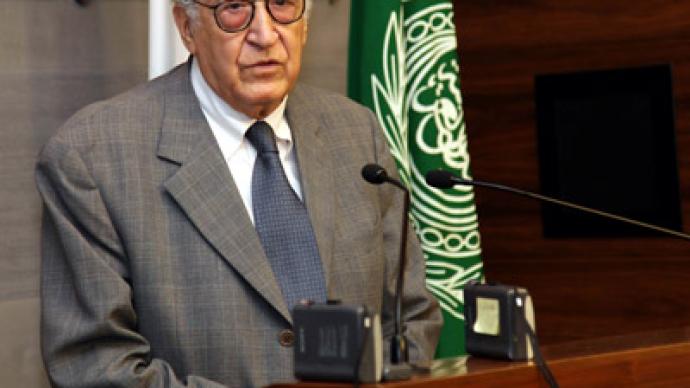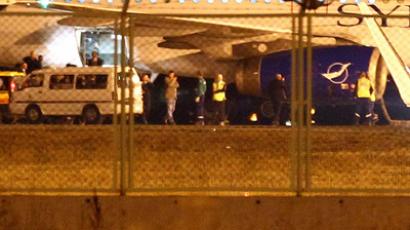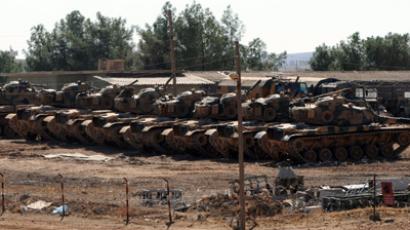UN Syria envoy calls for regime ceasefire amid doubts over rebels’ unity on issue

The UN and Arab League envoy to Syria has called on Assad’s regime to initiate a ceasefire. But while the government says it will “explore the option,” state-run media says the plan won't work due to rebels' lack of unified leadership.
Speaking in Beirut on Wednesday, Lakhdar Brahimi said if Assad’s government makes the first move, then everyone he has talked to on the opposition side will also accept the ceasefire. He said the truce would be a “microscopic” step toward ending 19 months of violence in Syria. Brahimi has asked Iranian officials to help broker the truce later this month. The Syrian foreign ministry says it is looking forward to talks with Brahimi, but stressed the rebels and their backers would also need to be involved.“The Syrian side is interested in exploring this option and we are looking forward to talking to Mr Brahimi to see what is the position of other influential countries that he talked to in his tour,” foreign ministry spokesman Jihad Maqdisi told AFP. “In order to succeed in any initiative, it takes two sides,” he continued.But Syria’s state-run Al-Thawra state-run newspaper was less optimistic about Brahimi’s plan, saying the biggest obstacle to a truce was the lack of an authority to sign for the rebels."There is the state, represented by the government and the army on one front, but who is on the other front?" the paper asked in an editorial on Wednesday.The country’s main opposition group – the Syrian National Council (SNC) – has backed Brahimi’s request. However, the SNC has previously been accused of failing to unite the opposition within Syria – leading many to criticize the ceasefire’s potential for success.The SNC is led mostly by Western-educated academics, so bridging the gap between the party’s figureheads and the rebel soldiers fighting the war is a task easier said than done – because not all opposition members belong to the SNC. The country’s many opposition groups vary in several ways, both principally and geographically. Several groups are holding out hope for a peaceful overthrow of Assad, while others are continuing the armed fight.The SNC, which is based abroad in Istanbul, consists of seven opposition groups focused on toppling Assad. It began working side by side with the Free Syrian Army (FSA) in January 2012. The FSA operates inside Syria, and is the country’s main armed opposition group. It is composed of both former members of the Syrian Armed Forces and anti-regime volunteers. The National Coordination Body for Democratic Change in Syria (NCB) is yet another group focused on ousting Assad – but the party has been shunned by the FSA and failed to reach any kind of agreement with the SNC. Last month, a meeting led by the NCB in Damascus called for the “peaceful overthrow” of Assad. The FSA boycotted the forum, accusing the NCB of not representing the true opposition and accusing them of being “only another face of the Syrian regime.” In March, a meeting between various opposition groups in Istanbul ended in walkouts and disagreement, with several smaller groups accusing the SNC of assuming too much power in the uprising against Assad.With so many opposition groups fighting against the regime in different ways, getting everyone to agree to a single ceasefire seems to be a very hard task. Even if rebels did find a way to organize themselves under a central command, the country’s growing number of foreign jihadists would probably remain out of the control of opposition groups. According to a panel appointed by the UN Human Rights Council, such fighters tend to push anti-government fighters towards more radical positions. It’s not the first time talks of a ceasefire have been on the table. Earlier this year, former UN envoy to Syria Kofi Annan proposed a ceasefire as part of his six-point peace plan. The plan was broken, and Annan began yet another plea for peace in the nation. Brahimi’s statements came during a regional tour aimed at ending the Syrian conflict. His trip has included stops in Egypt, Turkey, Saudi Arabia, Iran, and Iraq. He is expected to arrive in the Syrian capital of Damascus on Wednesday.Russia hopes Brahimi will also make time for a visit to Moscow later this month. A statement from the Russian foreign ministry said that the country supports finding the quickest way to resolve the conflict through political means. “As far as we know, Lakhdar Brahimi is holding meetings with all sides in Syria, as well as forces outside Syria, to formulate a clear concept for resolving the conflict. We await his arrival in Moscow to share our thoughts and ideas on the matter,” the statement said.














